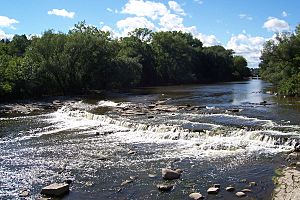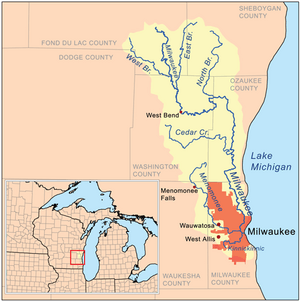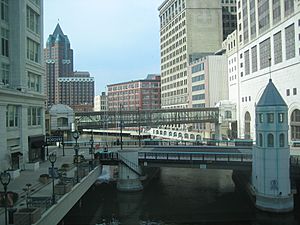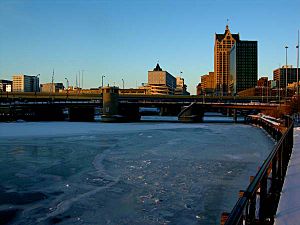Milwaukee River facts for kids
The Milwaukee River is a cool river in Wisconsin. It stretches for about 104 miles (167 kilometers). This river used to be a busy place for factories. Now, it's a popular spot for homes and fun activities. New apartment buildings fill the downtown area and harbor. Many young people are moving there. The river also has lots of parks along its banks. You can see kayaks, fishing boats, and even party boats sharing the water. A long path called the Riverwalk runs along the river in downtown Milwaukee. It has art, places to launch boats, and restaurants.
Contents
Where the River Flows
The Milwaukee River starts in Fond du Lac County, Wisconsin. It then flows south through towns like Grafton. Finally, it reaches downtown Milwaukee and empties into Lake Michigan. Three main smaller rivers join it: Cedar Creek, the Menomonee River, and the Kinnickinnic River.
The River's Watershed
A river's watershed is all the land where water drains into that river. The Milwaukee River watershed covers about 882 square miles (2,284 square kilometers). This area includes parts of several Wisconsin counties. These are Dodge, Fond du Lac, Milwaukee, Ozaukee, Sheboygan, Washington, and Waukesha counties.
The Milwaukee River's watershed is part of a bigger system. It belongs to the Lake Michigan subbasin. This subbasin is part of the huge St. Lawrence River Watershed. The St. Lawrence River Watershed gets its water from the Great Lakes.
River History
Long ago, Native American people lived near the Milwaukee River. They were here before Europeans arrived. Explorers like Jacques Marquette and Louis Jolliet traveled through the Milwaukee River. They used it to get to the Fox River and then to the Mississippi River. Around 1834-1835, the Milwaukee River was called "Maynawalky." The river we call the Menomonee River today was once known as the "Milwalky."
In the early 1800s, three small towns grew up along the Milwaukee and Kinnickinnic rivers. These were Juneautown, started by Solomon Juneau, Walker's Point, by George H. Walker, and Kilbourntown, by Byron Kilbourn. There was a big argument, known as the Milwaukee Bridge War, about building a bridge across the Milwaukee River. This argument was a key reason why the three towns decided to join together. They formed the city of Milwaukee in 1846.
River Bridges
Many bridges cross the Milwaukee River. Some of these are movable bridges. This means parts of them can lift or swing open. They let boats pass underneath. These bridges include bascule bridges, which lift up like a seesaw. There are also hydraulically-powered table bridges. Many other bridges are fixed, meaning they don't move. There are also bridges just for people walking and railroad bridges.
Here is a list of some bridges that cross the river, from north to south:
- Brown Deer Road Bridge
- Range Line Road Bridge
- Good Hope Road Bridge
- Green Tree Road Bridge
- Bender Road Bridge
- Silver Spring Drive Bridge
- Hampton Avenue Bridge
- I-43 Bridge
- Port Washington Road Bridge
- Capitol Drive Bridge
- Locust Street Bridge
- North Avenue Bridge (Milwaukee)|North Avenue Bridge
- North-Humboldt Pedestrian Bridge
- Humboldt Street Bridge
- Holton Street Viaduct (1926)
- Pleasant Street Bridge
- Cherry Street Bridge
- McKinley Avenue Bridge aka Knapp Street Bridge
- Juneau Avenue Bridge
- Highland Avenue Pedestrian Bridge
- State Street Bridge (Milwaukee)|State Street Bridge
- Kilbourn Avenue Bridge
- Wells Street Bridge (Milwaukee)|Wells Street Bridge
- Wisconsin Avenue Bridge
- Michigan Street Bridge
- Clybourn Street Bridge
- I-794 Bridge
- Saint Paul Avenue Bridge
- Water Street Bridge
- Broadway Bridge aka Milwaukee Street Bridge
- Hoan Bridge
The Union Pacific Railroad also has several railroad bridges crossing the Milwaukee River. These include bridges:
- north of Bender Road
- south of Silver Spring Drive
- Railroad Swing Bridge #1556 (built in 1915)
Parks Along the River
Many public parks are located along the Milwaukee River. They offer great places to play and enjoy nature.
| Parks | Location |
|---|---|
| Gordon Park, Kern Park, Lincoln Park, Pere Marquette Park, Pleasant Valley Park, Riverside Park | Milwaukee |
| Kletzsch | Glendale |
| Hubbard Park, Estabrook Park | Shorewood |
| Village Park | Thiensville |
| River Barn Park, Riverview Park, Scout Park, Shoreland and River Forest Nature Preserves | Mequon |
| Lime Kiln Park, Veterans Memorial Park, River Oaks Park, Grafton Canoe Launch | Grafton |
| Didier Field, East Riverside Park, Peninsula Park, Ehlers Park, Tendick Park | Saukville |
| Waubedonia and Marie Kraus Park | Fredonia |
| Riveredge Nature Center | Newburg |
| Quaas Creek Park, Riverside Park, Riverfront Parkway | West Bend |
| River Hill Park | Kewaskum |
| Columbus Park | Campbellsport |
River Dams
Dams are barriers built across a river to hold back water. Some dams on the Milwaukee River are still active, while others have been removed. Removing dams can help the river flow more naturally and improve conditions for fish and wildlife.
| Name | Town or City | Still There? | Year Removed |
|---|---|---|---|
| North Avenue Dam | Milwaukee | Removed | 1997 |
| Estabrook Park Dam | Milwaukee | Removed | 2018 |
| Kletzsch Park Dam | Milwaukee | Active | |
| Thiensville Dam | Thiensville | Active | |
| Lime Kiln Dam | Grafton | Removed | 2010 |
| Grafton Chair Factory Dam | Grafton | Removed | 1999 |
| Bridge Street Dam | Grafton | Active | |
| Waubeka Dam | Waubeka | Removed | 2004 |
| Newburg Dam | Newburg | Removed | |
| Woolen Mill Dam | West Bend | Removed | 1988 |
| West Bend | West Bend | Active | |
| Gadow Mill Dam | West Bend | Active | |
| Kewaskum Dam | Kewaskum | Active | |
| Lake Bernice Dam | Town of Ashford | Active | |
| Campbellsport Dam | Campbellsport | Removed |
See also
 In Spanish: Río Milwaukee para niños
In Spanish: Río Milwaukee para niños
 | Lonnie Johnson |
 | Granville Woods |
 | Lewis Howard Latimer |
 | James West |





